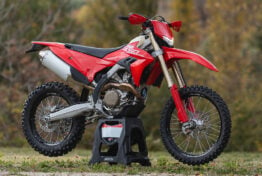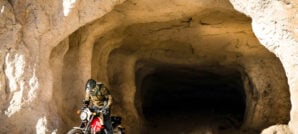Millions of Acres of Public Land Face Sale Under New Senate Bill
Riders risk lost access as swaths of public land face privatization out West.

Adventure riders rely on public lands, whether it’s carving desert two-track in Arizona or linking forest roads in Oregon. But new legislation now under review in the U.S. Senate could reshape the very landscape of riding opportunities in the West.
Tucked quietly into a sweeping Republican-authored budget reconciliation bill is a provision that includes a requirement to sell off roughly three million acres of federal land by 2030.
The provision, first introduced on June 11, was expanded just days later to include even more acreage. In total, around 250 million acres that are managed by the Bureau of Land Management (BLM) and U.S. Forest Service across 11 Western states, including Alaska, Arizona, California, Colorado, Idaho, Nevada, New Mexico, Oregon, Utah, Washington, and Wyoming could be considered eligible for privatization.

This isn’t the first time this year public land disposal was proposed as a revenue tool by lawmakers in this Congress. Just months ago, an attempt to mandate the sell-off of 500,000 acres of federal land was included in the initial version of the same reconciliation bill that passed the House. That proposal, which focused on dispersal of land in Nevada and Utah, drew swift bipartisan backlash and was ultimately stripped from the legislation before it moved to the Senate.
Now the Senate has created an even bigger potential land grab within the current reconciliation bill, including language directing the Secretary of the Interior to ensure that not less than 0.50 percent and not more than 0.75 percent of all BLM-managed land be sold to the private sector. Identical percentages apply to Forest Service lands, with sales overseen by the Secretary of Agriculture. Combined, BLM and Forest Service lands total nearly 440 million acres, which means between 2.1 and 3.3 million acres of public land could be sold, depending on which end of the range is enforced.
What’s missing from the bill, say critics, is any requirement for public involvement. Unlike traditional land management actions, the proposed sales would bypass public comment, skipping the input of local communities, land users, and stakeholders before lands are listed for auction.
| State | Total Acreage Available for Sale | USFS Acreage Available for Sale | BLM Acreage Available for Sale |
|---|---|---|---|
| Alaska | 82,831,388 | 15,944,525 | 66,886,862 |
| Arizona | 14,423,967 | 8,421,847 | 6,002,121 |
| California | 16,682,607 | 11,170,196 | 5,512,411 |
| Colorado | 4,352,632 | 9,384,415 | 4,968,217 |
| Idaho | 21,685,823 | 13,287,959 | 8,397,864 |
| Nevada | 33,580,624 | 3,527,280 | 30,053,344 |
| New Mexico | 14,312,074 | 6,479,502 | 7,832,572 |
| Oregon | 21,745,380 | 9,889,298 | 11,856,082 |
| Utah | 18,746,709 | 6,096,360 | 12,650,349 |
| Washington | 5,371,690 | 5,027,438 | 344,252 |
| Wyoming | 14,940,234 | 5,311,119 | 9,629,116 |
| Total | 258,673,128 | 94,539,939 | 164,133,190 |
The stated goal, according to proponents, is to raise funds for affordable housing and rural infrastructure. But land use advocates are skeptical, pointing out that many of the parcels under consideration are far from existing utilities or services. There are also no provisions to ensure that any housing built on sold land would remain affordable, and the bill allows the land to be used for any purpose after ten years.
Critics from across the spectrum — including conservationists, Indigenous leaders, ranchers, and even some conservative recreational users — have condemned the proposal as a short-sighted selloff of irreplaceable public assets.
For adventure riders, the implications are deep and personal. Much of the terrain we depend on for recreation lies within BLM and Forest Service jurisdictions. These lands host iconic trail networks, wide-open desert space, dispersed camping zones, and critical connectors that link longer backcountry routes. If sold, access could be immediately cut off, even in areas where trails have existed for generations. Private owners would have no obligation to preserve recreational access, and in most cases, would actively prohibit it.
The threat isn’t theoretical. In California, the popular Cow Mountain OHV area near Ukiah is on land eligible for sale under the bill. Local off-roaders, including long-time 4×4 and dirt bike clubs, have rallied in protest, pointing out that once land is privatized, it’s gone for good. Similar concerns have been raised in states like Utah, where vast swaths of BLM land near Moab and the San Rafael Swell could be targeted, and in Oregon, where national forest roads form the backbone of BDR-style dual-sport and adventure routes.
Dispersed camping is another major concern. For riders traveling long distances through remote terrain, the ability to pitch a tent on public land is a huge part of the riding experience. Losing access to those spaces would undermine one of the most valued freedoms adventure riding offers.

Because the bill allows for scattered, unconnected parcels to be sold, there’s a real risk of fragmentation. Even if main trails remain intact, key access points, connectors, or staging areas could disappear, making it difficult or impossible to complete established routes.
That kind of fragmented landscape isn’t hypothetical. Anyone who has tried to take an off-road adventure ride through Texas—a state that is 95% privately owned—knows how limiting privatization can be. The freedom to explore, to find your own line across remote terrain, or to camp wherever the day ends simply doesn’t exist when nearly every fence line is marked with purple paint—a color used throughout much of the South and West to signal “No Trespassing.”
Riders have good reason to be concerned. The land sale provision doesn’t just threaten favorite trails, it threatens the broader principle that public land should remain public. Stewardship, access, and shared responsibility all depend on that foundation.
The American Motorcyclist Association (AMA), which advocates for riders’ rights nationwide, has also expressed concern—and appears poised to step into the fray. ADV Pulse was in touch with Nick Haris, AMA’s Director of Government Relations, about the bill’s implications for public access and responsible land use.
“The current controversy surrounding the mandatory sale of public lands is well-founded,” Haris said. “Federal land management agencies have long employed a multi-step process to identify lands for possible disposal. This includes significant planning, evaluation and public input. The Federal Land Policy and Management Act also requires consultation with state, tribal and local governments. Congress would be well-served to listen to the many voices opposed to this proposal.”
For those who want to fight back, now is the time. With the Senate aiming to vote before the July 4 recess, riders can take action by contacting their senators, especially in affected states (Alaska, Arizona, California, Colorado, Idaho, Nevada, New Mexico, Oregon, Utah, Washington and Wyoming).
Joining forces with OHV groups, and simply spreading awareness within the riding community can help build pressure as well.
This isn’t merely another legislative cycle; it’s a crucial moment for those who ride and camp on public lands. The open spaces essential to adventure riding are facing imminent threat, and unless voices rise in opposition, locked gates and “private property” signs could replace freedom on our next adventure.
One of the greatest gifts we share as Americans is that we, the people, own these lands. All of us. Not just the wealthy or well-connected, not the politicians or corporations, but every citizen.
And not only do we get to enjoy them ourselves, we are able to proudly share them with all who come to America to experience the beauty and openness of our country. These lands offer space to explore, to challenge ourselves, and to find peace in a truly wild setting. If we lose this legacy, we lose not just land, but a very important part of what it means to be free in this country.
Backcountry Discovery Routes is also sounding the alarm on this issue, outlining quick steps you can take to contact lawmakers and speak up against public land sales:
Step 1
Dial your Elected Official’s phone number.
• You can call the U.S. Capitol switchboard at (202) 224-3121 to connect to your legislators in Washington D.C.
• You can find your Senators’ contact information HERE.
• You can find your Representatives’ contact information HERE.
Step 2
When the answering machine or person picks up, use the message below to guide your comments.
Step 3
Hello, my name is [insert name].
I’m calling to urge you to oppose any proposals in the budget reconciliation process that would mandate the sale or privatization of America’s public lands.
As someone who relies on these lands for outdoor recreation—whether it’s motorcycling, hiking, hunting, or camping—I’m deeply concerned about losing access. These lands are vital to outdoor recreation, tourism, and access to America’s backcountry.
Please protect public access and reject any provision that would authorize the selloff or transfer of federal public land. Our public lands must remain in public hands.
Thank you!
Step 4
Hang Up.











Notify me of new posts via email
Cutting Medicare/Medicaid, cutting the VA, Cutting education, Cutting Consumer Protections, Passing taxes onto the consumer to enable tax cuts for the uber wealthy; now, they want to also sell off OUR lands? Truly making America great again. Hopefully this doesn’t make it past the house, but just plain ludicrous that they are trying to pass this off as a way to create affordable housing. This should be bipartisan, “Don’t touch our public lands!”.